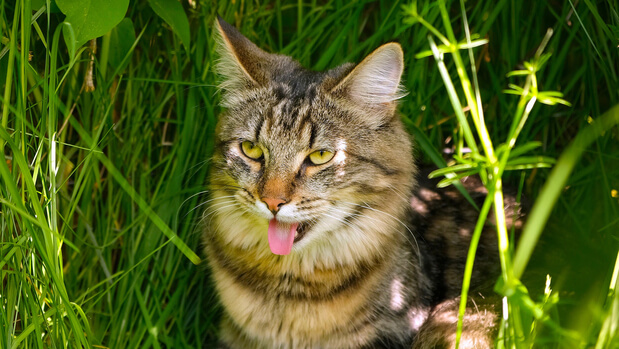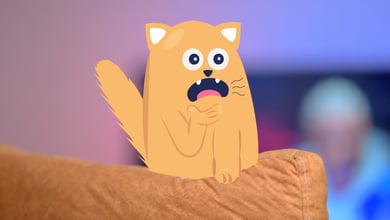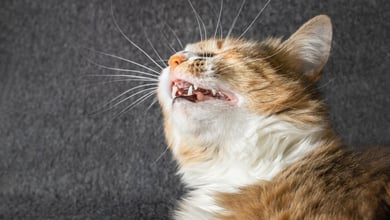Why Is My Cat Panting? 9 Possible Reasons

Table of Contents
While dogs often pant when hot or tired, a panting cat is less common. When cats pant, they keep their mouth open, tongues slightly out, taking quick, shallow breaths. This can be a simple reaction, like catching their breath, or a sign of a health issue.
Cats may pant due to reasons like exercise, overheating, pain, respiratory illnesses, asthma, heart failure, ingesting objects, stress, or anemia. While occasional panting might be normal, persistent panting could be a concern. Always consult a vet if you're unsure.
Now, let's dive into the common causes of cat panting:
1. Exercise
If you notice your cat breathing heavily after strenuous exercise, this is normal panting and not something to worry about. In cases like this, the cat's panting should reduce or stop once they catch their breath.
2. Heat
When cats get overheated, they cannot cool down by sweating like we do. Instead, they pant to cool themselves through evaporation.
3. Pain
Cats, especially older cats, don't always express long-term pain. However, mouth breathing can be a sign of pain.
4. Respiratory Illness
A respiratory infection could be a reason for a cat panting. Severe viral infections like feline infectious peritonitis can lead to difficulty breathing. In older cats, chronic bronchitis and other obstructive diseases can cause panting.
5. Asthma
Asthma is an inflammatory lung disease that causes your cat to have an asthma attack when triggered by stress, allergens, or diseases. The symptoms include increased respiratory rate, coughing, panting, and wheezing in cats.
6. Heart Failure
Heart disease is another serious cause of cats panting and can be related to a build-up of fluid around the lungs. Other clinical signs accompanying heart failure include pale gums and a fast heart rate.
7. Ingested or Inhaled Object
If there is one thing your cat is sure to do, it is to play. As such, they couldingest objects as they play with them. This ingested or inhaled object could block their airways, partially restricting their windpipe and causing them to pant and gag.
8. Stress or Trauma
Various things in your cat's environment can trigger stress. It's not always easy to pinpoint the cause. However, it is not abnormal to find your cat panting and acting weird when they are in a car, hear loud noises, or are introduced to a new environment or family member.
9. Anemia
Cats with anemia don't have enough red blood cells in their blood. These red blood cells are responsible for transporting oxygen throughout the body, so when a cat is anemic, they may experience rapid breathing to try and get extra oxygen to their remaining red blood cells.
Should My Pet Be Seen by a Veterinarian?
1. Have you noticed changes in your pet’s appetite?
2. Does your pet have diarrhea or loose stools?
3. Have you noticed changes in your pet’s thirst/water consumption?
4. Is your pet having accidents in the house?
5. Is your pet pacing and unable to settle?
6. Is your pet panting more than usual?
7. Is your pet whining or vocalizing more than usual?
8. Is your pet shaking more than usual?
9. Is your pet hiding or avoiding physical contact more than usual?
10. Is your pet more lethargic and sleeping more than usual?
11. Are you concerned about changes in your pet’s behavior?
12. Is your pet scratching their ears?
13. Is your pet licking their paws more than usual?
14. Does your pet have a rash?
15. Is your pet moving more slowly than usual or having a harder time getting up or down?
View Results
Should My Pet Be Seen by a Veterinarian?
1. Have you noticed changes in your pet’s appetite?
2. Does your pet have diarrhea or loose stools?
3. Have you noticed changes in your pet’s thirst/water consumption?
4. Is your pet having accidents in the house?
5. Is your pet pacing and unable to settle?
6. Is your pet panting more than usual?
7. Is your pet whining or vocalizing more than usual?
8. Is your pet shaking more than usual?
9. Is your pet hiding or avoiding physical contact more than usual?
10. Is your pet more lethargic and sleeping more than usual?
11. Are you concerned about changes in your pet’s behavior?
12. Is your pet scratching their ears?
13. Is your pet licking their paws more than usual?
14. Does your pet have a rash?
15. Is your pet moving more slowly than usual or having a harder time getting up or down?
Share Quiz
When to Be Concerned About Your Cat's Panting
Cats' panting is typically accompanied by short, rapid open-mouth breathing with their tongue out. You should seek immediate veterinary care when it is accompanied by other signs, such as:
📒 Note: If you notice your cat panting for more than a few minutes, or there are other concerning symptoms, seek emergency veterinary care.
The veterinarian will perform a physical examination, order diagnostics such as chest X-rays and blood work, evaluate the cat's lungs and prescribe veterinary prescriptions, oxygen therapy, or any other needed treatment to help improve their health and relieve their pain.
Conclusion
As a pet parent, it is important to keep your cat comfortable. If your cat is panting, it is best to identify the cause and do what you can to change anything that might contribute to the problem. However, some symptoms associated with heavy breathing in cats are related to serious health issues, and you visit a veterinarian immediately.
Same-Day In-Home Sick Pet Visits
Don't wait for your pet's condition to worsen. Our mobile veterinarians provide same-day and next-day in-home sick pet visits. Schedule now for peace of mind.
Frequently asked questions
Why is my cat panting without doing anything?
This could be because they are undergoing heat stress, anxiety, pain, lethargy, or respiratory distress. Try different proven ways to keep your cat calm. If they don't work, call your veterinarian.
How can I help manage panting in cats?
If your cat is panting due to exercise, let them rest and recover. If they're overheated, provide a cool space, water, and reduce stress. For infections, ensure regular vaccinations, heartworm prevention, and a clean environment. Early management is key to their comfort. Panting should be diagnosed and treated early to comfort them.
Do cats pant when sick?
Yes, your cats can suddenly start panting when they are in pain from sickness or experiencing symptoms of a disease.
Can dehydration cause panting in cats?
Yes, dehydration can cause panting in cats; however, panting is a more intense symptom of dehydration in your cat.
What diseases cause cats to pant?
Common cat diseases that cause panting include heartworm, anemia, obesity, feline asthma, hyperthyroidism, respiratory infections, congestive heart failure, neurological disorders, and other cardiovascular issues.






